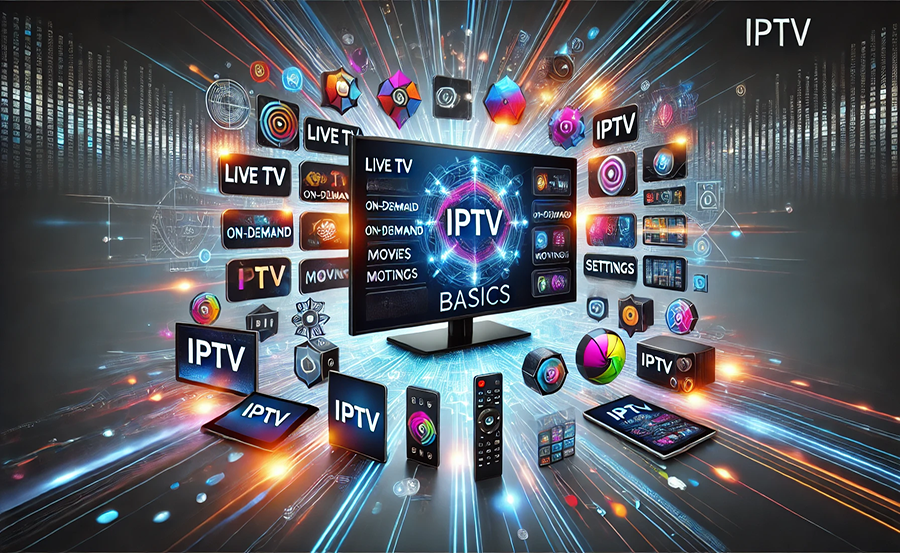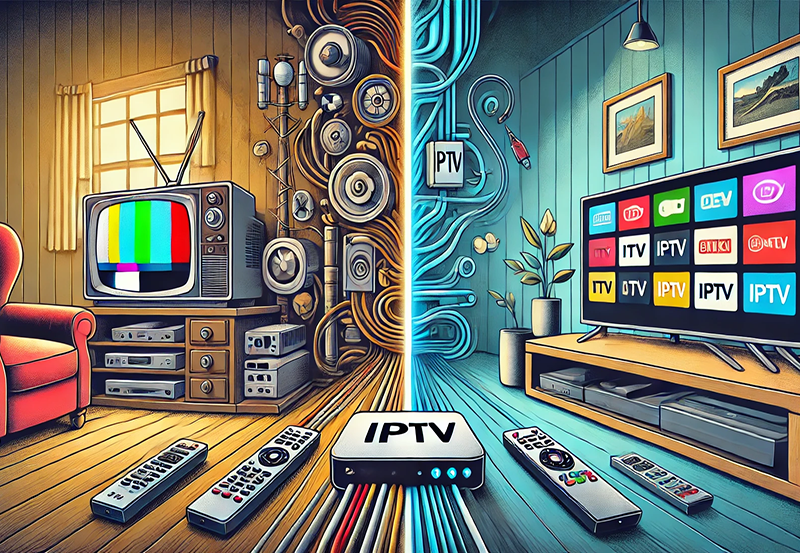Introduction to IPTV: A New Era of Entertainment
In today’s fast-paced digital world, traditional cable television is slowly becoming a relic of the past. With innovations in streaming technology, IPTV, or Internet Protocol Television, has emerged as a contemporary alternative that promises to revolutionize how we consume content. But like all technological shifts, it comes with its own set of advantages and drawbacks. If you’re considering making the switch, understanding these can help you make an informed decision about your entertainment future.
IPTV subscription services are cropping up everywhere, offering a plethora of channels, movies, and shows at the touch of a button. For both tech-savvy viewers and those new to this concept, it’s crucial to weigh the pros and cons to see if IPTV aligns with your viewing habits and preferences.
Understanding the Basics of IPTV
What is IPTV?
IPTV stands for Internet Protocol Television, a system through which television services are delivered to subscribers using the internet protocol over a network infrastructure. This might sound complex, but it simply means that IPTV uses your internet connection to beam television shows, movies, and live broadcasts directly to your device, instead of using traditional formats like satellite or cable.
Buy 1 Year IPTV Subscription and Enjoy Unlimited Content
How Does IPTV Work?
Unlike traditional television services, IPTV sends shows and movies through your standard broadband connection. Video content is streamed in blocks, making it possible to watch programming on demand. This internet-based approach allows for more flexibility and personalization in accessing television content, setting the stage for a unique viewing experience.
IPTV for Beginners: Getting Started
For beginners, diving into the world of IPTV might seem overwhelming at first. However, with a reliable internet connection and a compatible device, setting up IPTV can be surprisingly straightforward. Most IPTV services provide step-by-step guides to assist new users in configuring their systems efficiently.
Beginners should consider starting with a trial subscription to explore the features and functionalities available. These trials allow you to assess the service’s compatibility with your viewing habits without committing financially upfront.
The Advantages of Switching to IPTV
Customization and Flexibility
One of the most significant advantages of an IPTV subscription is the level of customization it offers. Unlike traditional cable packages, where you are stuck with a predefined set of channels, IPTV allows you to tailor your package according to your specific wants and desires. This means more control over what you watch and when you watch it.
- Choose specific channels or subscribe to themed packages.
- Access vast on-demand libraries at your convenience.
- Pause, rewind, and record live TV shows seamlessly.
Enhance Your Viewing Pleasure with High-Quality Content
IPTV platforms are renowned for offering high-definition and even ultra-high-definition content, enhancing your viewing pleasure. For users with the appropriate bandwidth, streaming quality can surpass that of traditional television, offering sharper images and clearer sound.
This high-quality content can make a significant difference, especially for those who enjoy watching sports, films, or any programming where visual fidelity is critical.
Multi-Device Access
Another compelling advantage of IPTV is its multi-device compatibility. You can watch your favorite shows on your TV, smartphone, tablet, or computer, allowing for unprecedented viewing flexibility. Whether you’re at home or on the move, IPTV ensures you don’t miss your favorite content.
This feature becomes particularly beneficial in households with multiple viewers, each with their device preferences. IPTV accommodates simultaneous streaming, satisfying different entertainment needs within the home.
The Disadvantages of Opting for IPTV
Dependence on Internet Connection
The Achilles’ heel of IPTV is its reliance on a stable and fast internet connection. Unlike cable TV, which remains unaffected by internet outages, IPTV is at the mercy of your internet service provider. Any interruptions or slowdowns in internet speed can result in lag, buffering, or complete service interruptions.
For users in areas with inconsistent internet connectivity, this can be a significant drawback. Before committing to an IPTV service, it’s essential to ensure that your internet plan can support seamless streaming, especially during peak times.
Potential Legal and Licensing Issues
With the popularity of IPTV, several unauthorized providers have entered the market, offering services without proper licensing. These can lead to legal repercussions for both the providers and their subscribers. It’s critical to choose legitimate, well-reviewed IPTV services to avoid falling into this trap.
Additionally, laws surrounding media consumption are continually evolving, and viewers must remain informed to ensure that their viewing habits don’t inadvertently breach local regulations.
Limited Customer Support Options
While traditional cable companies have established customer support teams, many IPTV services operate with minimal support infrastructure. Customers may find themselves frustrated when dealing with technical issues, as response times can be slower than what they’re used to with conventional providers.
It’s advisable for potential users to research customer service options before subscribing, ensuring they have access to responsive and effective support should they encounter problems.
Choosing the Right IPTV Provider: What to Look For
Assessing Content Offerings
When selecting an IPTV provider, the range and quality of content available should be a top consideration. Look for services that offer a wide array of channels, on-demand media, and exclusive content that suits your viewing habits. Ensure you’re not paying for content you won’t use or missing out on the channels you love.
Evaluating Cost-Effectiveness
Cost is often a decisive factor in the choice of an IPTV provider. While IPTV can be more affordable than traditional cable, prices can vary significantly between providers. Evaluate what you’re getting for your money, considering both the one-off setup costs and monthly subscription fees.
- Compare pricing plans between providers.
- Look for promotions or free trials to assess value.
Future of IPTV: What’s on the Horizon?
Emerging Technologies and Trends
The IPTV industry is poised for significant growth, driven by technological advancements and evolving consumer preferences. Innovations such as 5G could further enhance IPTV service reliability, while AI and machine learning promise more personalized viewing experiences.
With technologies evolving rapidly, future IPTV services might offer features and interactivity levels that are currently unimaginable, encouraging broader adoption and satisfaction.
Sustainability and Environmental Impact
In an era increasingly conscious of environmental issues, IPTV presents a more sustainable media consumption model. By reducing the need for physical media and hardware, IPTV contributes to a smaller carbon footprint compared to traditional television services.
Consumers now, more than ever, appreciate sustainable alternatives, making IPTV an attractive option for the environmentally inclined viewer.
Final Thoughts: Making Your Choice
Switching to IPTV is not just a decision about how you watch TV; it influences what you watch and the overall experience. While it promises several conveniences, there can be obstacles along the way. Balancing personal preferences with logistical considerations will help determine if IPTV is truly right for you.
For some, the ability to tailor their entertainment, enjoy high-quality streaming, and access content across devices will be a perfect fit. For others, the reliance on a strong internet connection and potential legal hurdles might temper their enthusiasm. Consider your priorities to make the switch that aligns with your lifestyle.
Frequently Asked Questions

What equipment do I need to start using IPTV?
Starting with IPTV requires a stable internet connection, a compatible viewing device (such as a smart TV, streaming box, or computer), and an IPTV subscription. Some setups may also require an additional application or device like a set-top box to access the full range of services.
Is IPTV legal in my country?
The legality of IPTV varies globally based on specific licensing and regulatory frameworks. While many legitimate providers operate fully within these laws, some offer unauthorized content. Prospective users should ensure their service is authorized and complies with local laws to avoid legal issues.
How can I ensure high-quality streaming on IPTV?
High-quality streaming largely depends on your internet speed—opt for an internet service plan that offers sufficient bandwidth for the quality you desire, especially if watching in HD or 4K. Additionally, using wired connections rather than Wi-Fi where possible can enhance streaming stability and performance.
Can I use IPTV while traveling?
Yes, most IPTV services allow you to stream content on multiple devices, which means you can watch your favorite shows while traveling as long as you have an internet connection. Be mindful, though, of any geographical restrictions or licensing issues that might arise when accessing content from different locations.
Why does my IPTV service keep buffering?
Buffering issues are typically caused by insufficient internet speed or network congestion. Ensure that your internet connection meets the speed requirements of your IPTV service, and consider upgrading your plan if buffering persists. Check for interference if using Wi-Fi or try using an Ethernet cable for a more stable connection.
Will IPTV replace traditional cable TV entirely?
While IPTV offers numerous advantages, it’s unlikely to entirely replace traditional cable systems in the near future due to varying consumer preferences and disparities in internet access. However, it will continue to gain market share as technology evolves and more consumers demand diverse viewing options.
Step-by-Step Guide: Fixing Missing Channels in XMLTV Guides for IPTV





